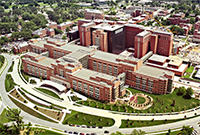
NIH Commits Nearly $100 Million to Build Big Data R&D Centers
The National Institute of Health (NIH) last week announced plans to spend $24 million per year for the next four years to establish a series of big data centers of excellence that will explore better ways to help biomedical researchers store, manage, and analyze large sets of data. In addition to traditional scientists, the governmental agency is encouraging data scientists to apply to receive funding under the research and development program.
 The image of the white lab coat-wearing scientist holed up in his lab conducting experiments with beakers of bubbling substances and fiddling with equations on a chalk board is an indelible memory in the scientific psyche. But today, research is increasingly more apt to take place on a computer, where models can carry out many experiments at a much faster rate than they can be done in the physical world, and where scientists can generate and consume large, diverse datasets in pursuit of medical breakthroughs.
The image of the white lab coat-wearing scientist holed up in his lab conducting experiments with beakers of bubbling substances and fiddling with equations on a chalk board is an indelible memory in the scientific psyche. But today, research is increasingly more apt to take place on a computer, where models can carry out many experiments at a much faster rate than they can be done in the physical world, and where scientists can generate and consume large, diverse datasets in pursuit of medical breakthroughs.
Despite the advances made possible by this data-driven approach, biomedical research is limited by a lack of effective tools, accessibility, and training in big data concepts. What’s more, scientists often cannot access data generated by others, creating a less-than-ideal situation for collaboration in scientific research.
The NIH hopes to begin changing this trend with its Big Data to Knowledge (BD2K) initiative, which it originally launched in December. Under the expanded plan unveiled last week, the NIH plans to establish six to eight BD2K Centers of Excellence to further the understanding and use of big data to help spur breakthroughs in the medical sciences and reduce the cost of healthcare.
“BD2K aims to enable a quantum leap in the ability of the biomedical research enterprise to maximize the value of the growing volume and complexity of biomedical data,” NIH Director Francis S. Collins, M.D., Ph.D, stated in the NIH announcement. “The goal is to help researchers translate data into knowledge that will advance discoveries and improve health, while reducing costs and redundancy.”
The NIH has opened the funding opportunities of its BD2K Centers of Excellence plan to people outside of the traditional scientific community. In particular, the NIH is looking for data scientists who want to explore innovative approaches and develop new software and tools to improve data integration, analysis, database development and management, and visualization and modeling. Any products developed from this R&D effort will be shared and distributed broadly to the research community, the NIH says.
The deadline for submitting a proposal to receive funding under the BD2K Centers of Excellence is November 20. The governmental agency will hold a webinar for prospective applicants on Thursday, Sept. 12, 2013, from 3 p.m. to 5 p.m. EDT. For more information about the event and the overall BD2K initiative, see http://bd2k.nih.gov.
Related Items:
Big Data Emerges in Indian Health Care
Interplay between Research, Big Data & HPC
Finding Value in Data Through Life Saving Applications






























